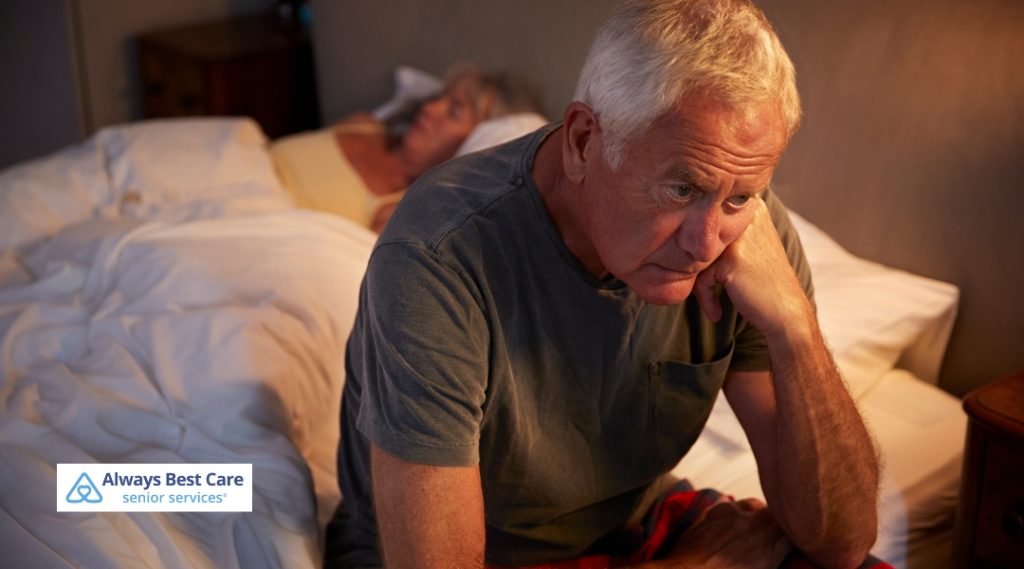Sleep Well: Practical Tips for Seniors Fighting Insomnia in Nashville, TN

Sleep is one of those things we often take for granted—until it starts slipping away.
For many seniors in Nashville, insomnia is an all-too-common struggle. Whether it’s the effects of aging, stress, or health issues, it can feel like a never-ending battle to get a good night’s rest.
But here’s the good news: improving your sleep doesn’t have to be difficult. By making a few changes to your routine and environment, you can start getting the sleep you deserve.
Let’s explore how seniors in Nashville can overcome insomnia and wake up feeling refreshed.
Table of Contents
Why Do Seniors Sleep So Much?
As we age, we tend to wake up more often during the night, leading to increased daytime sleepiness. This can lead to naps, which might help you feel better during the day but could interfere with your sleep at night.
Why Seniors Experience Insomnia
As we age, our sleep patterns naturally shift. For seniors in Nashville, this can mean waking up more often during the night, difficulty falling asleep, or feeling restless when you finally do sleep.
Medications taken for these conditions can also make falling asleep more difficult.
With all these factors at play, it’s easy to see why insomnia is so common among seniors.

How Insomnia Affects Seniors’ Health and Quality of Life
Seniors who struggle with insomnia often experience fatigue, irritability, and difficulty concentrating.
4 Tips to Create a Sleep-Friendly Environment in Nashville
- Room Temperature: The ideal temperature for sleep is between 60-67°F. Too hot or too cold, and you’ll find yourself tossing and turning.
- Lighting: Darkness is key to good sleep. If you’re sensitive to light, consider blackout curtains to block out streetlights or early morning sun.
- Noise Control: If you live near a busy street in Nashville, consider using earplugs or a white noise machine to block out disturbances that might keep you up.
- Comfortable Bedding: Make sure your mattress and pillows are supportive. If your bed isn’t comfortable, it could be contributing to your insomnia.
Establishing a Consistent Sleep Routine
Our bodies thrive on routine, and a consistent sleep schedule can help reset your internal clock. Seniors should aim to go to bed and wake up at the same time every day, even on weekends. This helps train your body to fall asleep and wake up naturally.
Creating a relaxing bedtime ritual can also signal to your body that it’s time to wind down. Try reading a book, listening to calming music, or practicing gentle stretches before bed. Avoid using electronics, as the blue light from phones and computers can interfere with your body’s sleep signals.

Exercise and Diet Tips to Improve Sleep
- Exercise: Regular physical activity helps seniors fall asleep faster and enjoy deeper sleep. Just be careful not to exercise too late in the evening, as it might leave you too energized to rest. Walking through Nashville’s parks or light stretching can be a great way to get moving without overdoing it.
- Diet: Avoid heavy meals and caffeine before bed. Caffeine can stay in your system for hours and keep you up, so try limiting it in the afternoon. A light snack, such as a handful of almonds or a small bowl of cherries, can promote sleep by helping to regulate melatonin levels.
Managing Stress and Anxiety for Better Sleep
Stress and anxiety are some of the biggest sleep disruptors.
Seniors may face stresses like health concerns, finances, or the loss of loved ones. These worries can keep your mind racing and prevent you from falling asleep.
Managing stress is crucial for improving sleep quality. Try using relaxation techniques, such as deep breathing, progressive muscle relaxation, or meditation, to calm your mind before bed.
If you find your thoughts are racing, try writing them down in a journal to clear your mind.
You can also try mindfulness exercises, which have been shown to reduce anxiety and promote restful sleep.

FAQs
1. How much sleep do seniors need?
Seniors generally need 7-9 hours of sleep, though individual needs may vary. It’s important to focus on the quality, not just the quantity, of sleep.
2. Can exercise help improve sleep?
Yes! Regular physical activity, like walking or gentle yoga, can help you fall asleep faster and enjoy more restful sleep. Just avoid exercising too late in the day.
3. What should I avoid before bed to sleep better?
Avoid heavy meals, caffeine, and alcohol right before bed. Also, try to steer clear of using electronics in the hour before sleep.
Sleep Well, Live Well in Nashville, TN
If you or a loved one are struggling with insomnia and need extra support, we are here to help.
Contact Always Best Care of Greater Nashville at (615) 678-0293 to schedule a care consultation and learn how our in-home care services can improve your quality of life. A restful night’s sleep is just a call away!





